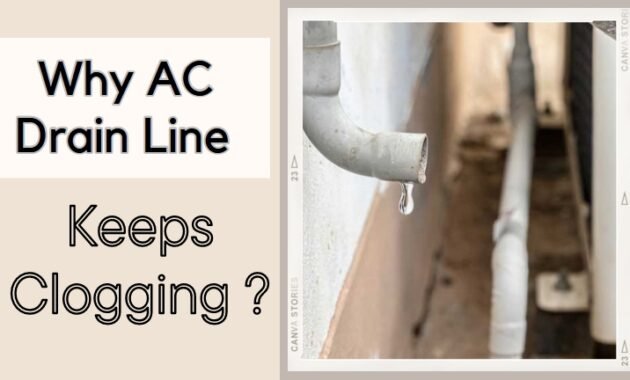A clogged AC drain line can lead to significant issues, including reduced efficiency and potential water damage. Understanding the causes and solutions for this issue is essential for maintaining your AC system. A clogged AC drain line is one of the most common and overlooked reasons.
No one wants to deal with a malfunctioning AC, especially during peak summer. Recognizing the importance of the AC drain line and understanding how to maintain it can save you from unexpected discomfort and potential repair costs.
As an HVAC professional with extensive experience, I’ve encountered numerous instances where clogged drain lines caused major problems for air conditioning systems. Here’s a detailed guide based on personal experience and industry best practices.
Why My AC Drain Line Keeps Clogging
The AC drain or condensate line is crucial in removing the moisture your air conditioner collects. This line can become clogged due to various reasons:
● Mold and Algae Growth
As your air conditioner operates, it collects moisture from the air and then travels down the drain line.
Over time, this consistent moisture becomes a breeding ground for mold and algae. Once they start growing, they can quickly multiply and create blockages within the drain line.

Not only can these blockages disrupt the function of your AC, but they can also pose health risks. Mold, in particular, can release spores into the air, triggering allergies and respiratory issues for some individuals.
● Dust and Pollutants
Microscopic particles fill the air in our homes, including dust, pet dander, and other pollutants. These particles can get trapped in the system as the air conditioner circulates air.
Read also: How to Check the Freon in a Home Air Conditioner
Then, this accumulation can mix with the moisture, forming a sludge-like substance that can clog the drain line.
● White Slime
White slime is a bacterial colony that can form in air handlers, especially in humid regions or during peak AC usage. The constant moisture combined with any present organic material provides an ideal environment for this bacteria to flourish.
White slime can block the drain line as it grows, leading to inefficiencies in the AC’s performance. Moreover, if left unchecked, it can become a recurrent issue.
What are the Implications of a Clogged AC Drain?
A clogged AC drain line isn’t just an inconvenience, as it can have severe repercussions:
● AC Malfunctions
A clogged drain line can lead to your air conditioner not performing optimally. When the line is blocked, the system can detect the buildup, causing it to shut down as a safety measure.
● Water Damage
The primary role of the AC drain line is to channel away the moisture the unit collects. This moisture has nowhere to go when clogged, leading to an overflow. This overflowing water can seep into walls, damage flooring, and even ruin furniture.
● Increased Humidity
When the drain line is blocked, the AC’s moisture gets trapped. It can result in a noticeable increase in indoor humidity, making your living spaces feel muggy and uncomfortable. High humidity can also promote mold growth.
● Corrosion
If water remains stagnant in the drain pan due to a clog, it can lead to rusting or corrosion of the AC components. Corrosion can significantly reduce the lifespan of your unit, leading to premature wear and tear and potentially costly replacements.
Read also: How Much Does Replace an Air Conditioner Capacitor Cost?
How Can I Avoid Clogging in the AC Drain Line?
Prevention is always better than cure. Here are some steps to ensure your AC drain line remains clog-free:
● Schedule Routine Maintenance
Schedule routine HVAC maintenance checks. Regularly flushing the drain lines with warm water or a vinegar-water mixture can prevent blockages.
● Ensure Proper Installation
Ensure that the drain pipes are installed correctly. Improperly sloped lines can increase the chances of clogs.
● Change Air Filters
Using efficient air filters and replacing them regularly can prevent dust accumulation, reducing the chances of clogs.
● Address White Slime
If you notice white slime, consider more frequent maintenance checks and consult with an HVAC professional for targeted solutions.
Personal Experience
In my years of experience, I recall a client who faced recurring clogs due to neglected maintenance. Their AC unit frequently shut down during peak summer months. Upon inspection, we found significant mold growth and dust accumulation in the drain line. After thorough cleaning and implementing a regular maintenance schedule, the issues were resolved, and the system operated smoothly.
Conclusion
A clogged AC drain line can cause significant disruption and potential damage to your AC system. Regular maintenance, proper installation, and timely professional interventions are key to preventing and resolving these issues.


